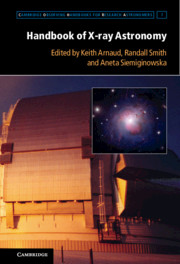2 - Detectors
Published online by Cambridge University Press: 05 June 2012
Summary
X-ray detectors
Any experiment in X-ray astronomy must, of course, have a detector to register the X-rays, turn them into some kind of electronic signal, and, from there, into data that can be stored for later analysis.
The goal is to return as much information as possible about the X-rays incident on the detector. These data could include the energy of the X-ray photons, their arrival time, their number, the location where they were detected (in two dimensions if possible), and their polarization state. It is often the case that information about one of these properties must be traded for more precise information about another.
Nearly all X-ray detectors also make excellent detectors for all other types of ionizing radiation and, in some cases, even optical or infrared light. This means that the detector must also return enough information to discriminate between an X-ray photon and, for example, an energetic charged particle.
Since the environment of space is hostile and generally far from a repair shop, detectors must be made robust and reliable, able to function in vacuum, heat and cold, and, if the instrumentation involves high voltages, avoid shorting out at all reasonable pressures.
Essentially any material that is suitable for building an X-ray detector will interact strongly with X-rays somewhere in the very broad bandpass required in many instruments (for example, 70 eV to 10 keV in the case of the Chandra observatory).
- Type
- Chapter
- Information
- Handbook of X-ray Astronomy , pp. 23 - 38Publisher: Cambridge University PressPrint publication year: 2011
- 1
- Cited by

